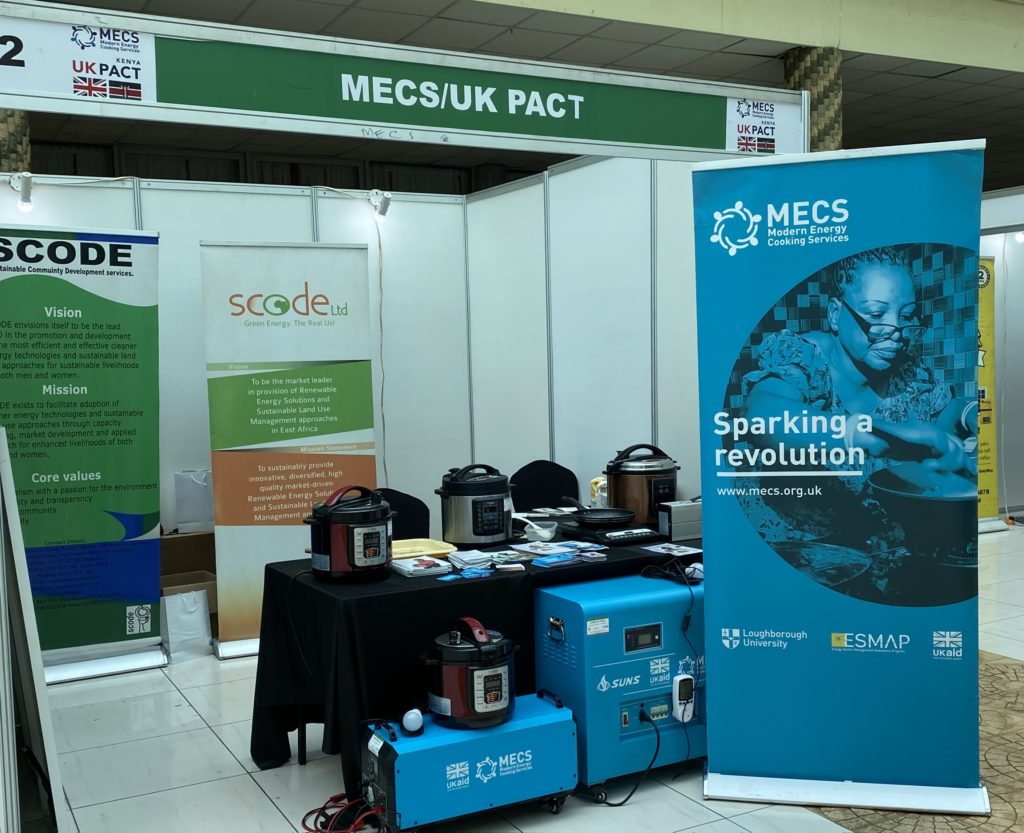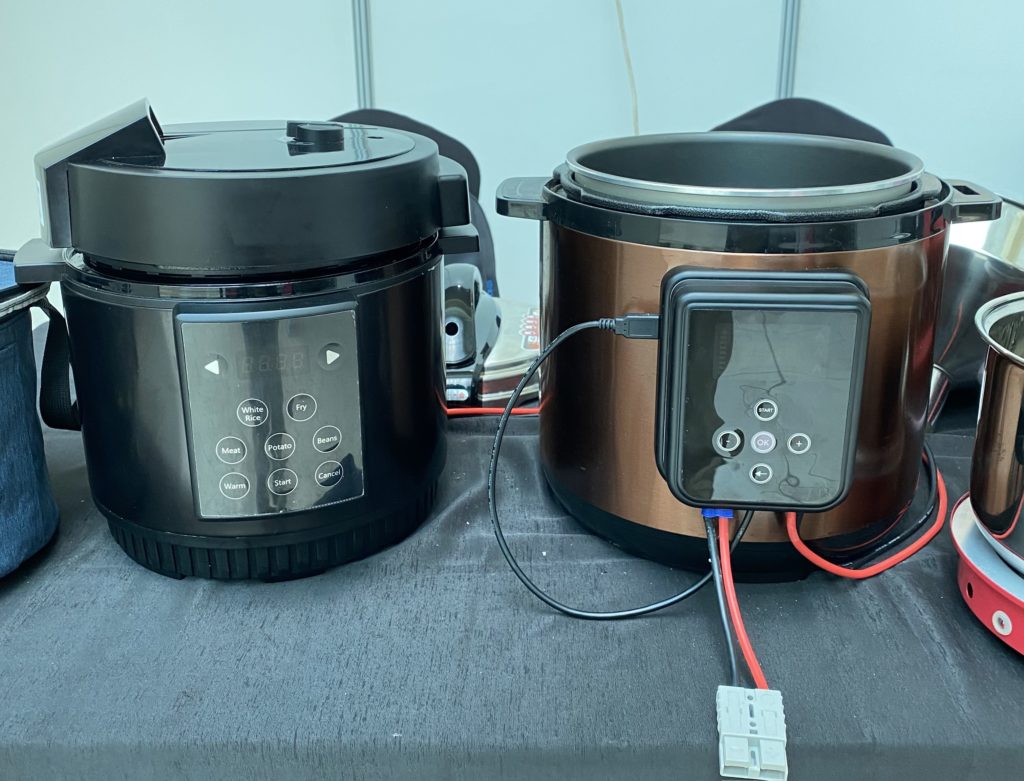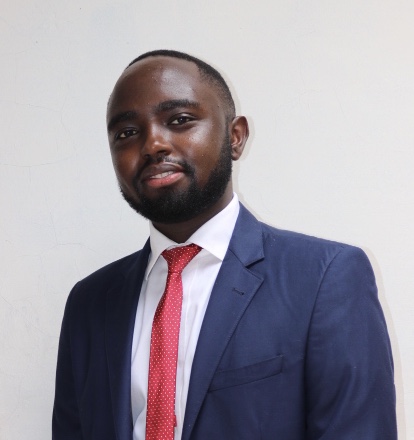We would like to thank Dr Jon Leary, Senior Research Associate at Gamos East Africa, for their contribution to this blog.
Kenya aims to achieve universal access to clean cooking by 2028. This commitment is in line with the national target of transitioning to the use of clean energy by 2030. As of 2018, 70% of Kenyans still relied on biomass fuels such as wood and charcoal for cooking. These fuels emit harmful particles that can penetrate deep into the lungs. An estimated 23,000 Kenyans die annually from cooking with these fuels, with this disproportionately affecting women and girls due to the differences in exposure. While these emissions are negligible in the context of global consumption, some estimates suggest that total greenhouse gas (GHGs) emissions from residential cooking are equivalent to approximately a third of total Kenyan GHG emissions. Besides emitting GHGs, the use of these fuels also contribute to deforestation and land degradation. There are only a few other cases where the benefits for both climate and human health are so abundantly clear.
The Kenyan Clean Cooking Week
In December 2022, the GSMA Digital Utilities programme participated in the Kenyan Clean Cooking Week organised by Clean Cooking Association of Kenya, in partnership with the Ministry of Energy. Under the theme ‘Transforming the enabling environment to achieve universal access to clean cooking by 2028’, the event explored the role of multiple stakeholders in supporting this transition.

Adopting alternative sources of cooking such as liquefied petroleum gas (LPG), ethanol and electricity is paramount to counter the negative effects of using biomass fuels. With Kenya well on its way to achieve universal electrification, currently standing at 75%, this presents an even greater opportunity to scale electric cooking, especially in urban areas. According to the World Bank, 94% of the urban population in Kenya has access to electricity, compared to 63% of the rural population. Coupled with the significant growth of the mobile ecosystem, these factors will contribute to the adoption of digitally-enabled clean cooking devices.
This blog explores the role of digital innovation in accelerating clean cooking and ensuring that no one is left behind, while providing successful examples of organisations working in Kenya. During the event, solutions such as GSM-enabled pay-as-you-go (PAYG) models and USSD codes to increase market awareness were discussed, highlighting the opportunity for the mobile industry in the sector.

Digitalisation in clean cooking
Innovations such as remote-locking systems and mobile payments, that have proliferated beyond solar home systems, are revolutionising the clean cooking industry. Through the GSMA Innovation Fund, we have had the privilege to play an instrumental role in testing new business models across essential utility services such as energy, water and sanitation.
In 2015, we awarded a grant to KOPAGAS (now Circle Gas) to pilot low-cost meters for LPG canisters and test a PAYG cooking gas service with 150 households in Tanzania. This service allowed customers to pay for as much gas as they could afford through their mobile wallets, and the Internet of Things (IoT) technology, in the form of sensors and machine-to machine (M2M) communication, enabled KOPAGAS to automatically lock the canister once the amount was used up. KOPAGAS also received another grant in 2018 from the GSMA to support subsequent expansion by validating fundamental market and operational assumptions to strengthen their PAYG business model. In 2020, Circle Gas Limited acquired KOPAGAS’ technology, expanding the smart meter to Kenya, operating as M-Gas. This project is supported by Safaricom, Kenya’s leading mobile operator, highlighting the interest of the mobile industry in clean cooking and PAYG use cases.
PAYG has also made clean cooking products such as induction stoves affordable to low-income households. Due to the high initial cost of purchase, daily or monthly instalments allows customers to make small payments, reducing the burden of owning the devices. ATEC, one of our grantees from our most recent round of innovation funding for digital urban services, has been offering their electric cookstoves in Bangladesh and Cambodia through PAYG, and is looking to expand into Kenya and other African and South Asian countries.
Digital technology and innovative financing
Besides the role that IoT is playing in the advancement of PAYG financing and smart meters, this frontier technology has become increasingly important in the generation of carbon credits. IoT enables clean cooking providers to track assets, monitor user behaviour and generate credits that can be used to subside the cost of the products. Carbon finance will play a big role in promoting the uptake of clean cooking solutions in Kenya. Globally, the carbon developer ecosystem observed a considerable expansion of cookstove projects, with over 50% growth when compared to 2021. Some local manufacturers, such as BURN, are already building their business around this new revenue stream. Recently, alternative impact investor, Carbon Neutral Royalty (CNR), announced a $25 million strategic partnership with BURN to finance the expansion of the developer’s carbon offset portfolio across Africa. KOKO Networks, a Kenyan-based liquid bio-ethanol provider is also selling carbon credits to companies, enabling them to subsidise the cost of their cookers and fuel and accelerate adoption. At the end of 2022, KOKO was in more than 750,000 households in Kenya. While carbon credits with their shortcomings are not the panacea to climate change, they are tangible solutions that are already supporting climate action and a just transition. With the right systems in place to ensure carbon removal and credit verifications, the carbon credit market has the potential to create a positive impact towards achieving the net zero goals. Gold Standard recently approved a new methodology by FCDO-funded Modern Energy Cooking Services and ClimateCare that streamlines verification of carbon-finance data using smart meter data like that of ATEC’s.
Innovative digital solutions also generate more reliable data that can be used for a range of innovative financing solutions besides carbon credits. Results-based financing (RBF) programmes such as the Kenya Off-grid Solar Access Project (KOSAP) and Global LEAP that seek to address market failures by establishing sustainable supply chains, scaling up markets and reducing the cost of cooking appliances, rely on manual tracking to verify sales. Verifying actual usage through manual methods such as expensive surveys can slow down the verification process, affecting RBF payments. With time, as remote monitoring and verification technologies develop, the cost of usage tracking will reduce significantly.
Looking forward
Digital solutions remain central in accelerating the adoption of clean cooking solutions. These solutions, when integrated with clean cooking technologies, can provide numerous benefits to both suppliers and consumers. The PAYG model and digital payments have increased the affordability of cooking devices for low-income customers and uncovered untapped markets for providers. IoT and big data have optimised operations and improved performance, making the sector more attractive to all.
Kenya is proactively playing a leading role in the transformation to clean cooking in Africa. It is the first country on the continent to develop an eCooking strategy, with several others already looking to Kenya for inspiration. Local partners are setting up multiple hubs across the counties to promote the adoption of e-cooking at the local level. There are also many other interlinked initiatives, led by the Ministry of Energy and Modern Energy Cooking Services, such as the Behaviour Change Communication Strategy, Kenya National Clean Cooking Strategy and eCooking Capacity Building & Market Development Programme (eCAP) that are raising awareness and strengthening the enabling environment for clean cooking. Bringing the much more advanced and already digitally-enabled electricity access sector into the clean cooking space could bring the ambitious target of universal access within reach.
The Digital Utilities programme is funded by the UK Foreign, Commonwealth & Development Office (FCDO), and supported by the GSMA and its members.



